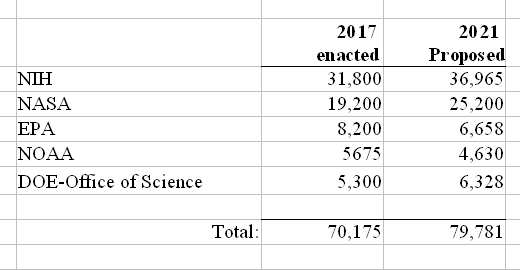Despite the panic over the Wuhan virus, it now appears that the overall U.S. death rate this winter season is at a multi-year low, no worse than 2014, 2016, and 2019, and far better than 2015, 2017, and 2018 (when we were hit with one of the worst flu seasons in years).
The article at the link for one example cites the totals for the first week in April:
On April 5th, the U.S. saw 1,344 COVID-19 deaths, as the number of cases in the U.S. accelerated. The overall number of deaths in the U.S., or the crude death rate did not show a correlated rise.
At the very least, this data shows we need to analyze COVID-19 deaths in the context of the broader U.S. mortality rate from all causes. It appears normal deaths are being attributed to COVID-19 if the patient is COVID-19+, even if another underlying chronic cause is responsible.
It then includes a graph showing the total deaths since 2014, plotted weekly. This year is remarkably ho-hum. The last two years were far worse. Go to the link and look at the graph for yourself if you have doubts.
Nor should anyone have ever been surprised by these numbers, even three months ago. All the evidence on the ground about COVID-19, once it had escaped from China and reliable data could begin to be gathered, suggested strongly that its general attack on humans was similar to the flu. Younger people were hardly bothered by it. Instead, it killed the old and sick. Since those people can’t die twice, it is manifestly obvious that we should have expected the overall numbers to not go up much.
Which is exactly what has happened.
Moreover, the panic over the Wuhan flu caused people to social distance themselves, which certainly acted to cause a drop in all infectious diseases. This might explain this year’s lower numbers, but it must also be noted that the drop in 2020 is not really that significant, illustrating again the pointlessness of all these preventative measures. You really can’t run from infectious diseases. They are going to spread through the population regardless. Only if it appears the disease is attacking the young should extreme measures be taken.
To put it bluntly, our elected leaders in Washington and in statehouses across the country, working in tandem with the incompetent (but well-paid) bureaucrats in Washington and with a overly emotional and partisan press willing to say any lie in order to attack Donald Trump, have caused what might turn out to be another great depression, for absolutely no reason at all.
In the process they have also acted to nullify the Constitution and the Bill of Rights, working as hard as they could to destroy the freest nation in the history of the world, and the most successful because of that freedom.
Are you enraged yet? And are you going to do something about it in November?

